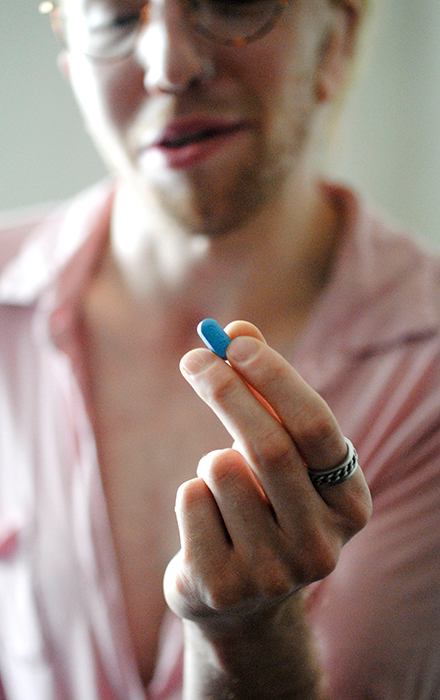
When Syd Bohuk’s alarm chimes, they swallow a bright blue pill, and continue with their day. Bohuk says this pill — PrEP, an HIV-preventive medication — has become a part of their daily routine, and is much less scary than they had originally anticipated. | Photo by Nicole McPheeters
When their phone reminder chimes at 10:50 a.m., Syd Bohuk, who uses they/them pronouns, pulls out a Monday-through-Sunday pill organizer, snaps open the Thursday lid, and swallows the contents. Bohuk is not shy about this, as it has become a normal part of their day. In fact, if someone asks what it is they are taking, Bohuk is happy to share that it is PrEP.
Syd is one of several patients who have gained access to PrEP (Pre-Exposure Prophylaxis) through Positive Link, an HIV/AIDS-focused nonprofit clinic on East Miller Drive, south of downtown Bloomington and based out of IU Health. PrEP is a daily medication that lowers the chances of contracting HIV in individuals with higher risk factors. By protecting the body’s T-cells, a type of white blood cell in the immune system, PrEP can lower the risk of contracting HIV from intercourse by more than 90 percent. (Some people use it to prevent contracting HIV from injection drug usage, which lowers the risk by more than 70 percent, but that is considered an “off-label” use.)
Despite the potential of this medication, according to the U.S. Centers for Disease Control and Prevention, PrEP is reaching only 8 percent of the estimated 1.1 million people nationwide who are potential candidates for PrEP. With this in mind, Positive Link, which opened its new clinic in December 2017, has made it a primary goal to increase awareness of the drug. Through providing this direct service to patients, they hope this will help decrease the spread of HIV in southern Indiana.
PrEP, sold under the brand name Truvada, is a combination of two HIV medicines, tenofovir and emtricitabine. Michael Kukulka, a registered nurse at Positive Link, explains to patients that Truvada has been a part of HIV treatment for several years.
“HIV treatment usually consists of three types of drugs that attack HIV from different angles,” Kukulka says, “and Truvada has been a part of that combination as a reverse-transcriptase inhibitor.”
Although Truvada was approved by the FDA for use as PrEP for HIV-negative people in 2012, Indiana consistently registers between 540 and 620 new HIV diagnoses every year. The Indiana State Department of Health reported that last year 12,635 individuals were living with HIV/AIDS in Indiana, an increase of 8 percent since 2015. As part of raising awareness in the Hoosier State, Positive Link emphasizes the effectiveness and simplicity of taking the medication.
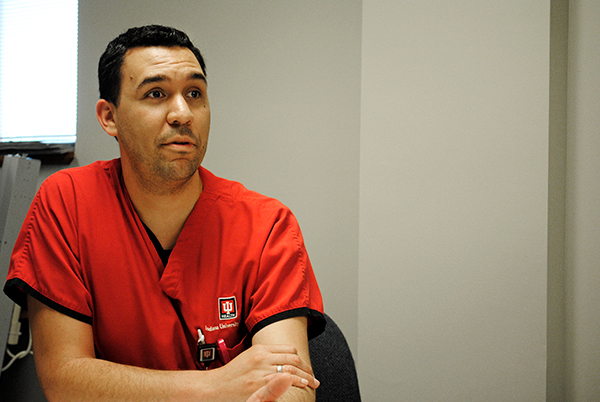
Michael Kukulka is a registered nurse at both IU Health Bloomington Hospital and Positive Link, an HIV/AIDS-centered clinic that is based out of Indiana University Health. | Photo by Nicole McPheeters
“It is a pill you take once daily. It has minimal side effects and is safe for the body,” explains Kukulka, who views PrEP as instrumental in the prevention of contracting HIV.
Prevention is cheaper than treatment
As the PrEP navigator for Positive Link, Jesse Elkins understands the challenges of healthcare coverage all too well. When Elkins meets with patients, such as Bohuk, he tries to help them understand that gaining access to PrEP is easier than they might expect. “We will discuss some of the barriers in their lives and develop a plan to overcome them,” he says.
For example, knowing that cost is a common obstacle in access to healthcare, Elkins educates each patient on the various programs available that make PrEP more affordable. Truvada can cost about $1,300 per month, but it is covered under most insurance plans because HIV prevention is generally cheaper than HIV treatments. Additionally, an individual with health insurance can utilize a prescription co-pay card from Gilead, the manufacturer of Truvada. Elkins describes this program as a “helpful crutch” to assist an individual in meeting their deductible.
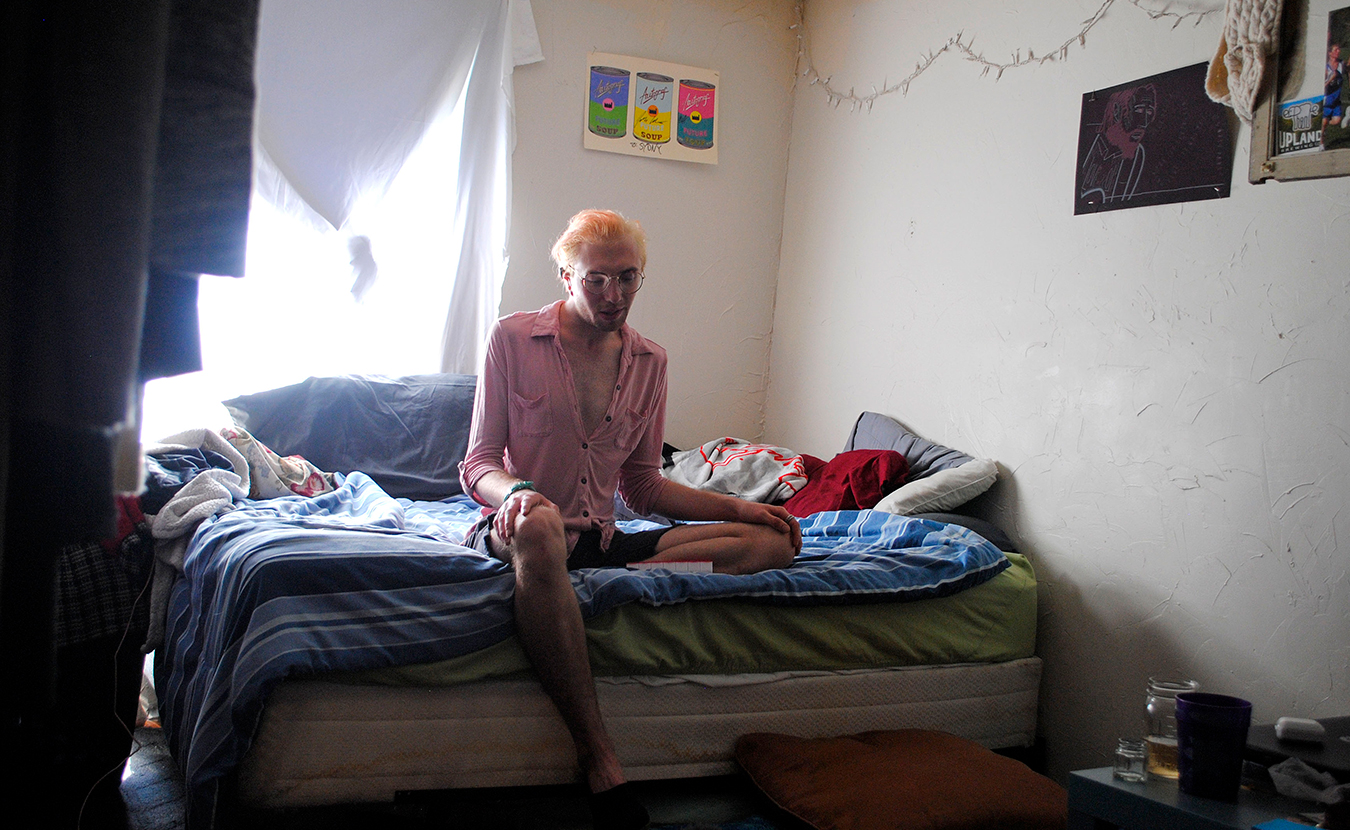
Bohuk sits in their room at 10:45 a.m. In 5 minutes, an alarm set on their phone will chime, signaling them to take their daily PrEP pill. Bohuk says, “I realized it’s just a pill. I am protecting myself and my partners. Why is there shame in that?” | Photo by Nicole McPheeters
Individuals without health insurance coverage also have access to PrEP. Gilead offers financial support for the uninsured through their Advancing Access program. If an individual is without medication coverage and falls below $60,000 in gross annual income, or $81,000 for a household, Advancing Access covers prescription fees in full.
“Healthcare and insurance are not always user-friendly,” adds Elkins, “but if a patient is able to tell me what they need and want, we will find a way. They just have to come to us.”
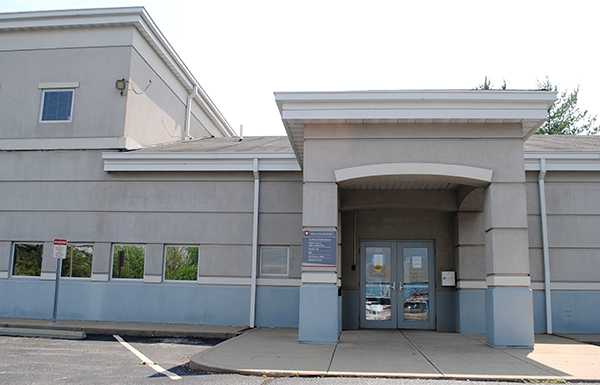
Positive Link is at 333 E. Miller Dr. in Bloomington. Also included at this location are additional services like the Monroe County Public Health Clinic, WIC, Community Health Services, the Beat Tobacco Clinic, and Housing Services. | Photo by Nicole McPheeters
Overcoming the stigma
For Bohuk, who identifies as queer and nonbinary, the cost of the medication was not the only concern they had when taking that first step toward getting on PrEP.
“More than anything, I was nervous to face the conversation,” Bohuk says. “Any member of a marginalized community has some internal shame that they carry with them. I certainly had some of that.”
Bohuk initially felt that being on PrEP would be like “outing” themself to those around them. If people were to see them take the pill, Bohuk was afraid it could result in personal questions they felt they may not be ready to answer. Luckily, this fear began to subside after an initial PrEP interview at Positive Link.
“I had a stigma in my head that was holding me back,” they say, “but I realized it’s just a pill. I am protecting myself and my partners. Why is there shame in that?”
Emily Brinegar, the prevention coordinator at Positive Link, says this stigma can have consequences. Empowering patients, she says, helps them to take the healthier approach toward prevention.
“As humans, we are prone to not always making the best decisions when we are anxious or afraid,” Brinegar says. “Many times when these fears are not addressed, they can result in risky behaviors.”
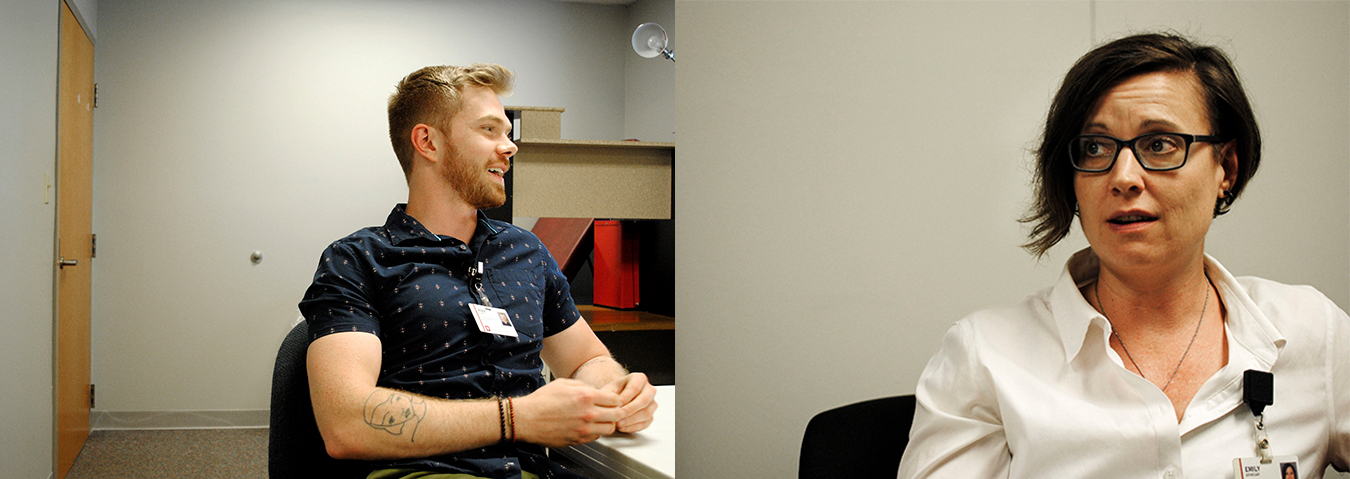
(left) PrEP Navigator Jesse Elkins sits in a conference room at Positive Link. It is Elkins’s primary responsibility to assist clients with the ins and outs insurance coverage, ensuring each patient receives the proper amount of assistance from their healthcare provider. (right) Emily Brinegar is Positive Link’s prevention coordinator, whose job it is to create ways to spread awareness of HIV transmission, as well as to educate on preventive measures that can be taken by those at risk of contracting the disease. | Photos by Nicole McPheeters
An easy pill to swallow
Positive Link highlights education as a valuable tool in overcoming some of these fears. Once Bohuk began to understand how PrEP works, they had more faith in the effectiveness.
“After each pill, my anxiety lessened,” says Bohuk. “I now have easier conversations about it with my partners.”
As an outspoken advocate for HIV prevention, Bohuk believes that PrEP has not only helped them take a healthier approach to life, it has also given them more confidence to share their experience with others.
“It’s not that deep, you’re not going to drown,” they say. “You will learn to wade through all of the stigma, and when you reach the other side, you are going to feel a lot better.”
Nicole McPheeters contributed to this reporting.


